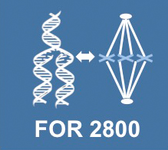Forschergruppe 2800 (FOR 2800), SP3
Laufzeit: 01.03.2019 - 28.02.2022
Partner: Petra Beli, Mainz; Holger Bastians, Göttingen; Matthias Dobbelstein, Göttingen; Zuzana Storchova, Kaiserslautern; Bernd Wollnik, Göttingen, Räschle Markus, Kaiserslautern; Johanna Flach, Mannheim/Heidelberg
Förderkennzeichen: KS52/4-1
Förderung durch: DFG
Projektmittel (€): 274,450
Kurzfassung
Replication stress (RS) and chromosomal instability (CIN) are commonly observed features of cancer cells. RS has a destabilizing effect on the genome and, vice versa, whole chromosome aneuploidy as a result of CIN can induce a RS response. Our preliminary data analysis of cancer genomic data suggests a tendency of whole chromosome CIN (W-CIN) to co-occur with structural CIN (S-CIN), whilst S-CIN can also appear in numerical stable tumors. We also found a significant positive correlation of...Replication stress (RS) and chromosomal instability (CIN) are commonly observed features of cancer cells. RS has a destabilizing effect on the genome and, vice versa, whole chromosome aneuploidy as a result of CIN can induce a RS response. Our preliminary data analysis of cancer genomic data suggests a tendency of whole chromosome CIN (W-CIN) to co-occur with structural CIN (S-CIN), whilst S-CIN can also appear in numerical stable tumors. We also found a significant positive correlation of mRNA expression levels of the ATR gene and SUMO genes with CIN, possibly reflecting the presence of RS in high CIN tumors. This analysis will be extended in this project to mine TCGA tumor samples and COSMIC cell line data for associations and causal relations of mutations, copy number aberrations, gene expression and methylation patterns with W-CIN and S-CIN, thereby providing a genetic and functional basis for W-CIN and S-CIN, which can be related to markers of RS. By using and developing manifold learning approaches for proteomic data sets, we will collaborate with Petra Beli (SP1) to identify posttranslational modifications (PTMs) and the induced disruptions of signaling networks or pathways necessary to overcome mechanisms for the maintenance of chromosomal stability in response to RS. We will derive patterns and signatures of numerical and structural aberrations arising from mitotic dysfunctions in response to RS, which are experimentally studied by Holger Bastians (SP2) and compare these patterns to human cancer data. To understand the RS response to aneuploidy and CIN, as well as the adaptation program of evolved cell populations to CIN, we will analyze genome and transcriptome data from the lab of Zuzana Storchová (SP8) and compare signatures of this response to data from human cancers. We will contribute to SP-Z with the deep analysis of NGS data and incorporate these into our various integrative data analyses. These will require the development of new statistical learning techniques, which will include attempts to use causal statistical inference approaches for observational data, possibly overcoming the inherent limitations of purely correlative and associative models» weiterlesen» einklappen


